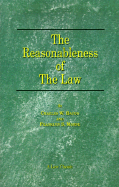|
|
|
|
||||||

|
The Reasonableness of the Law
By Charles W. Bacon and Franklyn S. Morse 2000/04 - Beard Books - Law Classic 1893122867 - Paperback - Reprint - 414 pp. US$34.95 An interesting discourse on law as the perfection of reason, and showing that the law is the application of reason to the problems of social control. Publisher Comments
This volume is engrossing and thought-provoking reading for students of history, government and the law. To support the premise that the causes and forms of law are found in the experience of mankind, the authors explore the origins of law, the progress of law, and the principles of law in its reasonableness. Law is founded on principles of right and wrong that never change, but the application of these rules varies with changes in social and economic conditions and in conceptions of right and justice. Covered in this illuminating discourse are the legal bases of American governments, constitutional law, equity as a law of prevention, international law, and statute law. No book review available Charles W. Bacon was a member of the New York Bar and the author of The American Plan of Government. Franklyn S. Morse was an instructor in history in the Collegiate School of New York City.
|
|
|
|
home
| about us
| contact us
| related
sites |